Interview: Playwright Tom Jacobson World Premieres THE BAUHAUS PROJECT Part 1 & Part 2 & CREVASSE at 3 L.A. Theatre Companies
Prolific playwright Tom Jacobson world premieres his two latest works The Bauhaus Project and Crevasse in July
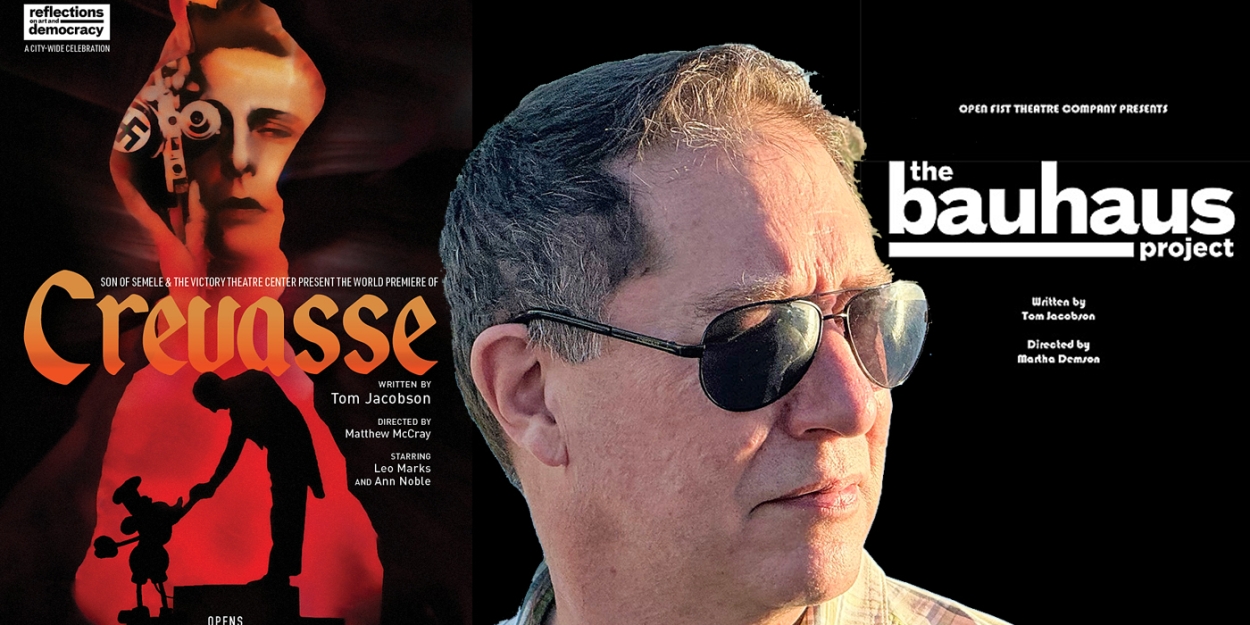
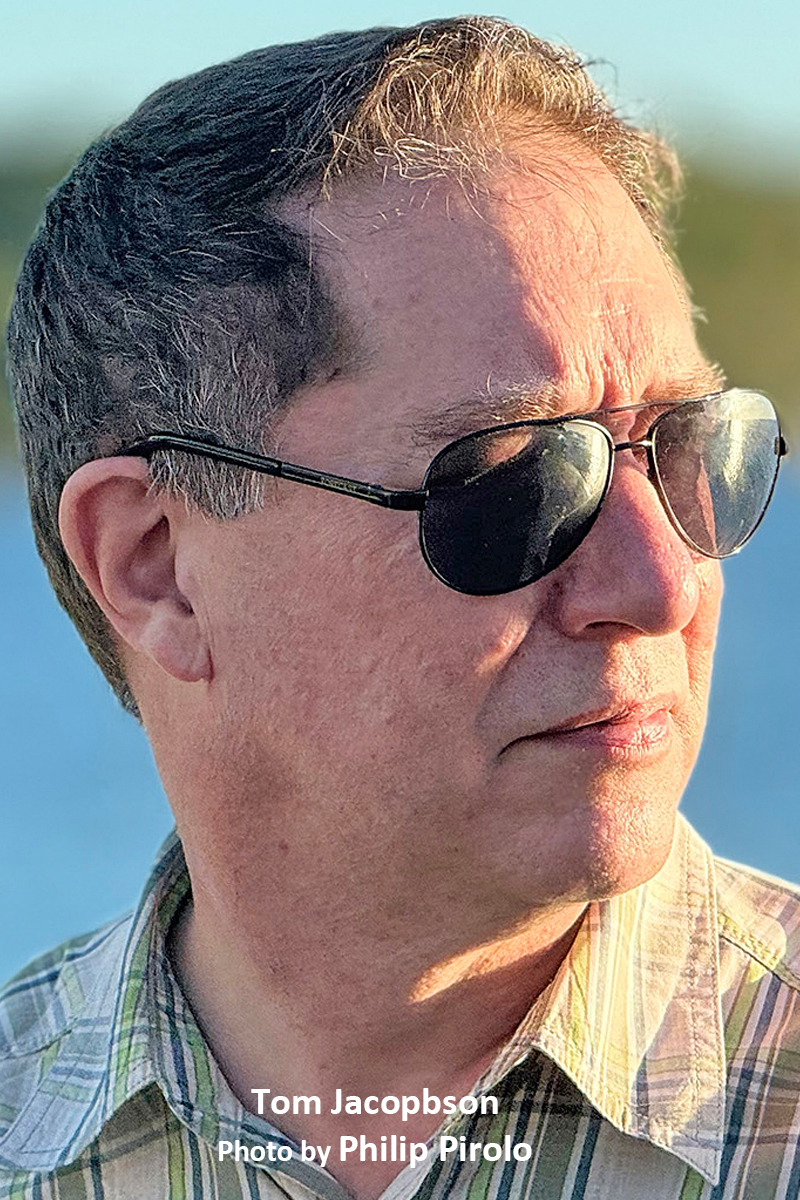
Prolific playwright Tom Jacobson world premieres his two latest works The Bauhaus Project and Crevasse in July. Open Fist Theatre Company premieres The Bauhaus Project, a theatrical event presented in two parts (Part 1: Bauhaus Weimer and Part 2: Bauhaus Dessau and Bauhaus Berlin) opening July 19, 2024, at Atwater Village (with previews July 12th, 13th and 14th). Son of Semele and The Victory Theatre co-produces Crevasse beginning July 26 (with previews July 19th and 20th) at the Victory Theatre. In The Bauhaus Project, Martha Demson directs the cast of Jack Goldwait, Sang Kim, Katarina Joy Lopez, Chloe Madriaga and John C. Sweet. In Crevasse Matthew McCray directs Leo Marks and Ann Noble. The ever busy Tom was ever gracious enough answer a few of my queries again.
Thank you for allowing me to interview you again, Tom.
Always happy to be interviewed by you, Gil!
You’ve written 54 plays so far since 1994. Is that right?
I've written 68 plays, with 46 produced (including The Bauhaus Trilogy and Crevasse) — 43 produced in L.A., so Bauhaus and Crevasse will be numbers 44-46.
68, that is an amazing output of plays! Your play subjects include wide topics and controversies. What sparked you to write Bauhaus?
After the production of my three plays in The Ballad of Bimini Baths (Plunge at Son of Semele, Tar at Playwrights Arena, and Mexican Day at Rogue Machine), my husband said “Oh, you write trilogies. You have to write a trilogy about the Bauhaus: Bauhaus Weimar, Bauhaus Dessau, Bauhaus Berlin.” Ramone has taught at Art Center College of Design for more than 40 years, so the Bauhaus is close to his heart. I told him, “Nobody would care about that topic but you.” However, I find it’s best to do as he says, so I researched the Bauhaus and found lots of drama and an inspiring story that has turned out to be quite timely. Ramone is always right.
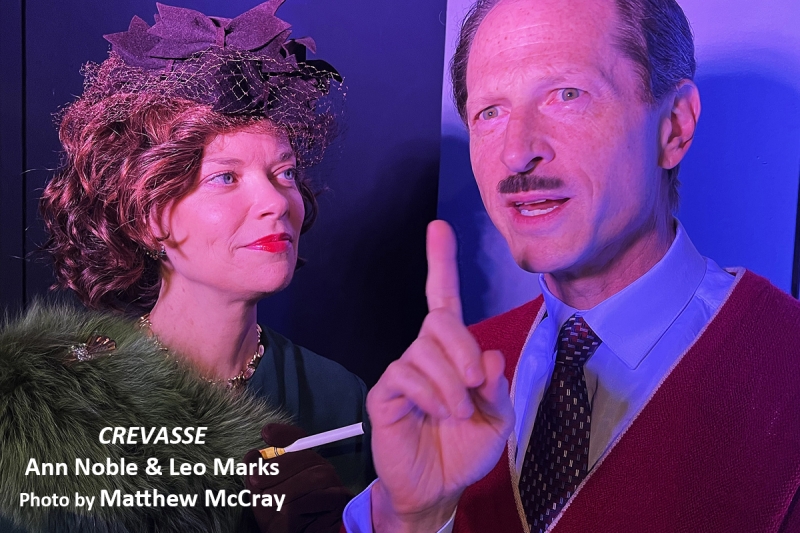 What was your inspiration for Crevasse, which opens later in July?
What was your inspiration for Crevasse, which opens later in July?
I had a strange memory of a play about Leni Riefenstahl visiting Walt Disney being produced in L.A. many years ago, but no one in the theatre community remembered it and neither did Google. There have been a handful of plays on the topic, but not in L.A. and not approaching it in the same way I wanted to. So I did a bit of research and discovered that the archive for Leni’s U.S. publicist, Ernst Jaeger, was housed at USC. I don’t think very many people have looked at it since most of it’s in German. My Swiss cousin translated many of the German documents—mostly correspondence between Leni and Ernst—so I was delighted to have information that wasn’t available previously. I read a great deal about Disney and Riefenstahl and learned a lot of amazing facts that added up to a dramatic true story with intriguing gaps for me to fill in. For instance, Disney was working on Pinocchio, Bambi and Fantasia at the time of Riefenstahl’s visit, and all three films deal with myths and morals in ways that resonate with her life and work. The structure is based on the Disney studio tour that frames the 1941 animated short The Reluctant Dragon, which was shockingly queer for its time.
What would your three-line pitches for The Bauhaus Project Part 1 and Part 2 be?
Five 21st Century Southern California art students on probation are offered an opportunity to redeem themselves by presenting a comprehensive project on the history of the Bauhaus school of art and architecture. Most of them are reluctant—why should this diverse group of L.A. youth care about what a bunch of white people did a hundred years ago? In 1919 the Bauhaus was born in the ashes of WWI with an optimistic manifesto proclaiming that egalitarian design could save the world. But from the beginning, the school was in conflict with increasingly conservative governments and bedeviled by artistic geniuses with their own ideas of art and design. Part 1 focuses on internal conflicts between the Bauhaus masters while foreshadowing the rise of fascism. Part 2 escalates the external conflict leading to the Nazi closure of the Bauhaus in 1933. The overall theme of education as a radical political act couldn’t be more relevant because today America faces many of the same threats Germany did a hundred years ago.
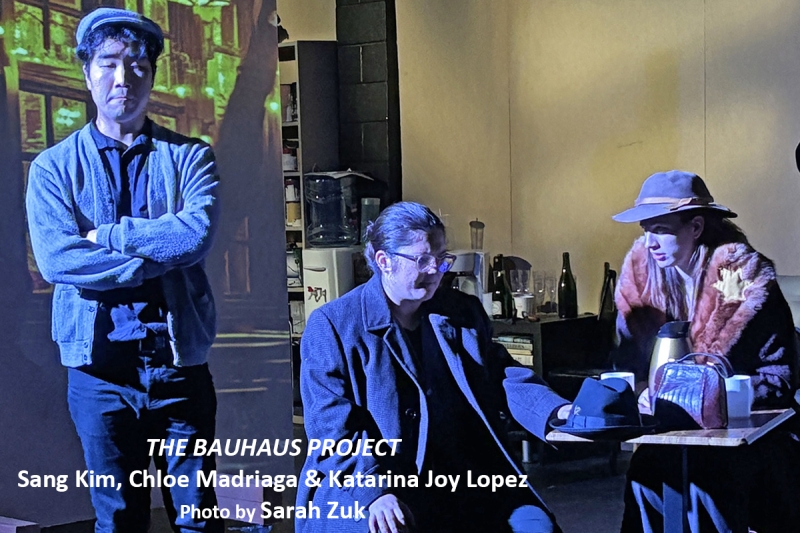 Your five-person cast play Southern California art students that enact multiple historical creative figures. Is there an historical creative you most identify with?
Your five-person cast play Southern California art students that enact multiple historical creative figures. Is there an historical creative you most identify with?
I’ve had management and leadership roles in a number of nonprofits, so I identify strongly with the challenges faced by Walter Gropius as the founder of the Bauhaus and Ludwig Mies van dear Rohe, the director at the time of the Nazi closure of the school. But my heart truly breaks when I see how anti-Semitism had such a profound and personal impact on Bauhaus figures, some who died in Auschwitz and one who helped design it.
What would your three-line pitch for Crevasse be?
In 1938 Leni Riefenstahl was a superstar filmmaker and the most famous German other than Adolf Hitler. She thought she could come to Hollywood to get American distribution of her award-winning and brilliant documentary on the1936 Berlin Olympics. But only a few days after Kristalnacht, her timing couldn’t have been worse. No one in Hollywood would meet with her… except Walt Disney. History knows the outcome of that meeting, but what did these two genius filmmakers actually say to each other that day and how did it change the world?
Any character in Crevasse you identify with mostly?
Ann Noble and Leo Marks, the two incredible actors playing Walt and Leni, each play two other characters. Leni’s publicist, Ernst Jaeger, was married to a Jewish woman, Lotte Jaeger, so he wasn’t allowed to work under racist Nazi laws. She divorced him so he could accompany Leni to Hollywood and perhaps save both their lives. Ernst faces profound moral choices and terrifying consequences throughout the play, including the loss of his wife and child, and he’s the guy who put Walt and Leni in the same room. By putting them all on stage, I feel I’m paying homage to Jaeger’s stage management as well as the problematic genius of Riefenstahl and Disney.
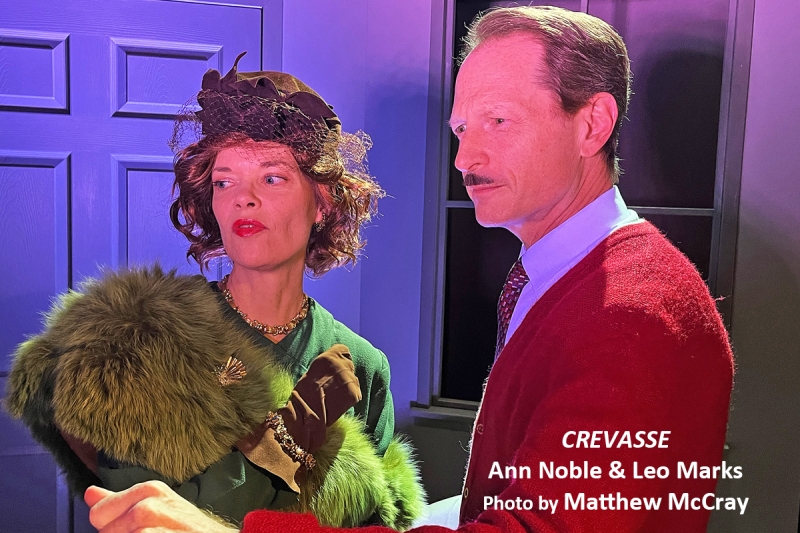 Last I interviewed you, you told me you always work under some version of the Dramatists Guild-approved contract which formally guarantees you the approval of the director, cast, designers and other artistic elements of your plays. When did you get first get involved with pre-production for Bauhaus? The moment Open Fist agreed to produce it?
Last I interviewed you, you told me you always work under some version of the Dramatists Guild-approved contract which formally guarantees you the approval of the director, cast, designers and other artistic elements of your plays. When did you get first get involved with pre-production for Bauhaus? The moment Open Fist agreed to produce it?
Open Fist produced the world premiere of my play Walking to Buchenwald, and that experience deepened my friendship with Martha Demson, the artistic director of Open Fist and an important leader in the Los Angeles theatre community. We’ve worked together closely since she first read the play before the pandemic and have workshopped it with dozens of talented Los Angeles actors over the last several years.
And same question for Crevasse when Son of Semele and the Victory Theatre center agreed to produce it?
Matt McCray did an outstanding job when he directed my play Plunge (part of the Ballad of Bimini Baths trilogy) in 2018, so he was one of the first directors I asked to read Crevasse. His enthusiasm led to a number of private readings for friends and theatre colleagues, and I was thrilled when he said he wanted to produce it. Maria Gobetti also expressed admiration for the play, so a co-production between Son of Semele and The Victory Theatre was a perfect fit!
Have you worked with any of Bauhaus’ of Crevasse’s actors or creatives before?
I really enjoyed working with Matt on Plunge, and Ann starred in my plays Bunbury and The Friendly Hour at The Road Theatre Company. I’ve also been a huge Leo Marks fan for years, so bringing these three extraordinarily talents artists together is a dream come true. The young actors of The Bauhaus Project are just starting their theatrical careers, and it’s been exciting to see how their own identities are shaping the play under Martha’s nurturing direction. The wonderful designers for both plays are deeply respected throughout the Southern California theatre community, and I’ve worked with several of them on other shows. With these two plays as part of the summer Reflections on Art and Democracy program, it’s like bringing two families together for a big, joyful reunion!
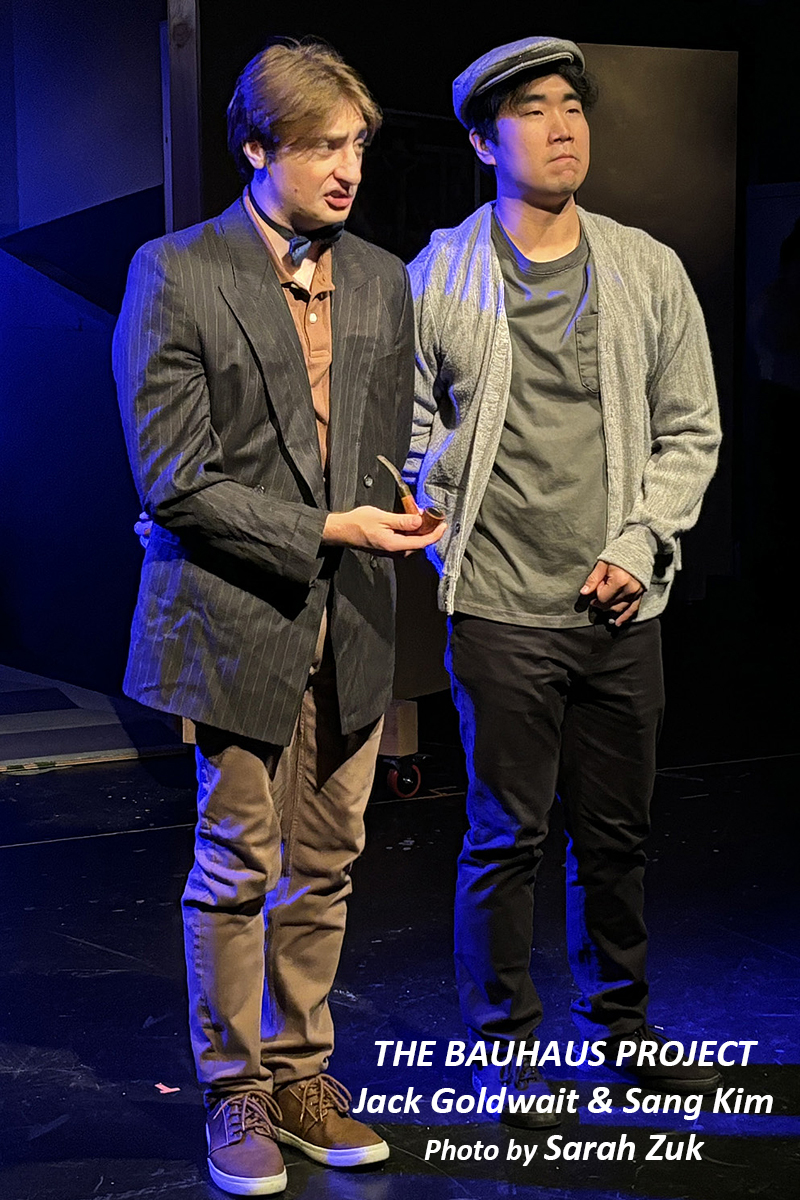 Your play The Beloved Disciple was first produced at the L.A. Complex in 1994. What changes in the Los Angeles theatre scene have you noticed over the years?
Your play The Beloved Disciple was first produced at the L.A. Complex in 1994. What changes in the Los Angeles theatre scene have you noticed over the years?
After I got my MFA at UCLA, my first L.A. production was The Glory of Her Sex at the West Coast Ensemble in 1987, and I worked at the Cast Theatre as a play reader soon after. Since then, the evolution of Equity Waiver to the 99-Seat Theatre Plan to the current structure for intimate theatre represents the most profound change for me. It’s more financially challenging to produce plays in today’s environment, but new opportunities continue to arise like the Hollywood Fringe Festival and Snehal Desai’s commitment to better connecting Center Theatre Group to the Southern California theatre community. I’m hopeful that a new theatre service organization will rise from the ashes of the LA Stage Alliance and lead to greater recognition of the extraordinary role Los Angeles plays in developing new and exciting theatrical work.
When I last interviewed you in 2016, you were involved with various theatre companies in non-writing positions. Which theatre companies do you currently hold positions in?
So many theatre companies in Los Angeles are important to me, but I’ve given up literary management and board positions for the time being. Right now, I’m focused on theatres that produce my work, and I help them with fundraising because producing is so much more expensive now. I’d love to be an artistic director of an intimate theatre because it would be a good confluence of my arts management skills and my commitment to developing new plays—a dream job!
Do you have a few play topics percolating in your resourceful mind?
I’m developing a script called The Bachelor’s Club in MADLab at Moving Arts about the surprising history of the LGBTQIA+ community in Oklahoma City where I went to high school (and came out). Other topics that intrigue me include social change in cultural institutions such as the Natural History Museum and LACMA where I worked for many years. I love organizations and see them as reflections of society as a whole as well as a way to create community. They’re also full of humans, which means conflict, which means drama…
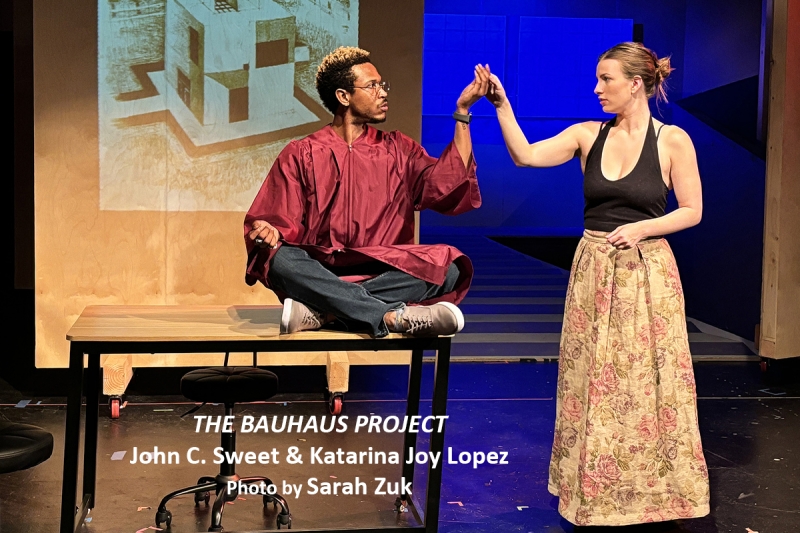 What’s in the ever future for Tom Jacobson?
What’s in the ever future for Tom Jacobson?
I’m doing something I’ve never done before, which is outlining a novel. I’ve been writing plays for so long that the process is very clear to me, especially in terms of discipline and economy. But I’ve loved novels since I was a kid, and I’m excited about the much wider and deeper landscape a novel allows. I’m not yet a novelist, but my theatre background means I can play the role of a novelist and speak in multiple voices like a playwright. And I don’t have to worry about renting a theatre, paying artists or building a set and costumes. When I write a novel, I’m the playwright, director, designer and all the actors… and every reader gets to cast, direct, act, costume and design the book as they read the words. In that way it’s even more deeply collaborative than theatre, and nothing’s more fun than creating art together.
Thank you again, Tom! I look forward to meeting all your historical creatives.
For tickets to Crevasse through August 18, 2024; go to www.thevictorytheatrecenter.org
For tickets to Bauhaus Project, Part 1 & Part 2 through August 25th; click on the button below:
Comments
Videos

